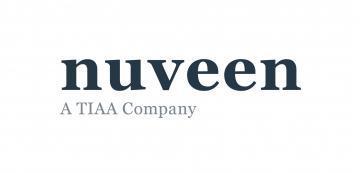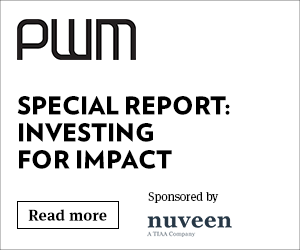
Investing with impact across asset classes
Amy O’Brien, Nuveen’s global head of responsible investing, discusses how investors can effectively address social and environmental issues using their portfolio
With interest rates rising to fight inflation and recession looming, where do you find the most attractive impact investment opportunities in alternatives?
When we think of alternatives, we’re thinking of real assets. That’s real estate, infrastructure, farmland and timberland, which offer compelling impact opportunities. And thanks to stable cashflows, inelastic demand in many cases and low volatility, these real assets have been historically useful for softening the impact of other hard-hit assets in a tough macro environment.
Attractive impact investments can be found in these private markets and publicly listed assets. For example, social impact can be achieved in real estate with affordable housing. Real estate can also help with environmental goals through energy efficiency and sustainable building practices. There’s a role too for sustainably managed timberland and farmland in portfolios. And infrastructure offers solutions for investors looking for opportunities in the transition to a low-carbon economy with opportunities in renewable energy and mass transit.
How can investors effectively address social and environmental issues in their portfolio?
Allocating to impact strategies in your portfolio should follow the same thought process of other strategies. Be purposeful in what goals you want to achieve. Be intentional.
Fortunately, industry resources are available to help, such as the Global Impact Investing Network, the UN Principles of Responsible Investing and the sustainable development goals (SDGs). We’ve found the SDGs are incredibly valuable in providing a common set of goals and helping orient conversations, focus efforts and organise reporting.
These resources offer investors a way of framing their impact goals and reporting the outcomes. For example, we developed a six-step impact investing process for our affordable housing investments, starting with articulating our impact goals, right through to disclosing impact measurement and exiting responsibly. This approach is underpinned by selected SDGs, providing a robust process for achieving our intended impact outcomes. Real estate is just one example. Frameworks can be adapted across asset classes.
Private markets have historically lent themselves particularly well to impact investing, but can investors generate impact through public markets?
Public markets offer many routes to create positive impact. That can be investing directly in equities or bonds, or in collective investment vehicles that are themed around impact goals, such as carbon reduction, renewable energy or affordable housing.
As I’ve said, whether you’re looking at impact in real assets, fixed income or private equity, it is essential to be intentional in your investment aims.
In public markets, we have already seen how companies have started to embrace environmental, social and governance (ESG) factors as broad investor sentiment began to prioritise it.
Companies engaging with investors on ESG issues, and taking steps to improve transparency is happening, albeit at different stages for different firms around the world. But it is becoming increasingly normalised. It’s a sign of the growth potential available in public equities from an impact perspective, and one that should encourage investors to see the space for impact in public markets.
For investors, it’s important to take an active approach with impact strategies, particularly in public markets. Whether that’s seeing how companies report environmental and social issues, such as supply chains and modern slavery, or managing a portfolio to target environmental aims, such as looking at companies which focus on green and renewable energy.
Being clear about why and how you invest from an impact perspective is crucial in whichever asset class you consider. And it’s where robust investment processes play a vital role. I’ve mentioned our six-step process for investing in real estate; we have equally rigorous processes across asset classes.
At Nuveen, we need to understand the relevant impact metrics when we look at investing in an asset, be that a bond, stock or real asset. This can include the carbon footprint and intensity of an asset, its energy and water consumption, and how many jobs are created from a social perspective. Our processes and proprietary frameworks allow us to have a better overview of what we’re coming into, the impact that the investment is making and the overall impact there has been by the time we exit. Our impact reporting in fixed income has been acknowledged as industry-leading, having won Environmental Finance’s Bond Awards impact report of the year 2022.
How can investors best use public fixed income markets to address large-scale, systemic challenges?
We’ve seen impact opportunities in the fixed-income market grow significantly. Initially, they were focused on green bonds that finance renewable energy projects. But over the past decade, the opportunity set has expanded across a myriad of additional social, community, sustainable and climate-aligned themes and outcomes.
For example, blue bonds focus on ocean preservation and restoration, while orange bonds are issued to raise funds for gender-equality initiatives. Social impact investment broadly has grown with areas such as racial justice, and even vocational training is generating significant interest and activity. In public health, Covid-19 relief bonds funded the manufacturing of personal protective equipment, increased staffing at hospitals and expanded access to vaccinations and other health services.
Nuveen worked closely with the World Bank and the Global Environment Facility to create the Seychelles blue bond. It aims to expand the conservation of the Republic of Seychelles’s marine areas, develop the governance of fishing areas, along with improving the country’s economy through sustainable fishing practices.
The blue bond, which was the first sovereign bond of its kind, raised $15m — a relatively small amount, but one that demonstrates the power that investors have to have a positive impact that aligns with clear environmental and social goals.
Investment funds are available that focus on these kinds of bonds, as well as bonds issued by ESG leaders who use best-in-class practices to demonstrate their ESG credentials. At Nuveen, we define that as companies or organisations that exhibit leading, innovative or model behaviours that we believe the broader industry should emulate.
Private banks claim there are not enough investment solutions in the impact investing space. Do you think we will see this change and to what extent?
Investing for impact
We’re seeing opportunities to include impact as part of a portfolio are becoming far more readily available to all investors, through different asset classes and investment vehicles.
I think the ingredients are in place for impact to move into the mainstream of investment philosophy. As it does, the misconception that there is a trade-off between impact and returns will continue to erode. That will help grow the investor base for impact strategies, and eventually, impact will be part of a traditional portfolio, rather than be spoken about separately.
How else do you think impact will evolve?
Outside of debunking those myths around impact investing, I think noticeable developments will be seen in the measurement and reporting of impact metrics.
There’s a growing trend from clients wanting impact data on nearly every part of their portfolio, not just the impact-oriented investments and responsible investing branded products. We’re on the way to this being the norm for investors and issuers.
We’re already seeing the development of ESG-focused regulation. This is at varied stages globally — Europe continues to lead other regions, especially the US. The European Commission recently introduced standards for labelling ESG funds under the umbrella of its comprehensive Sustainable Finance Disclosure Regulation. While we can expect regulatory scrutiny to continue to increase around the world, the pace will be different from one region to another.
This regulatory scrutiny is to be welcomed, as it will help in furthering universal standards for measuring progress. This will have an added bonus of pushing forward that intentionality of impact investing, as a more robust dataset will encourage investors to not only see the opportunity, but also demonstrate the effectiveness of these strategies.
Partner for success
Nuveen is among the top 20 largest global asset manager, according to the latest annual Pensions & Investments rankings. It has $1.1tn in assets under management as of June 2022, and more than 50 years’ experience in responsible investing (RI), more than $41.8bn in RI focused strategies as of September 2022, and more than 30 years’ experience in impact investing with over $10bn deployed in impact strategies as of December 2021.
Nuveen also makes this impact investment methodology available to Italian clients through specific investment funds, which aim to generate alpha by having a positive and measurable impact on the real world.
This content was produced by the advertising department of PWM, in collaboration with Nuveen.
The views and opinions expressed are for informational and educational purposes only as of the date of production/writing and may change without notice at any time based on numerous factors, such as market or other conditions, legal and regulatory developments, additional risks and uncertainties and may not come to pass.
Past performance is no guarantee of future results. Investing involves risk; principal loss is possible.
Responsible investing incorporates Environmental Social Governance (ESG) factors that may affect exposure to issuers, sectors, industries, limiting the type and number of investment opportunities available, which could result in excluding investments that perform well.
NOT FDIC INSURED | NO BANK GUARANTEE | MAY LOSE VALUE
Nuveen provides investment advisory solutions through its investment specialists.





